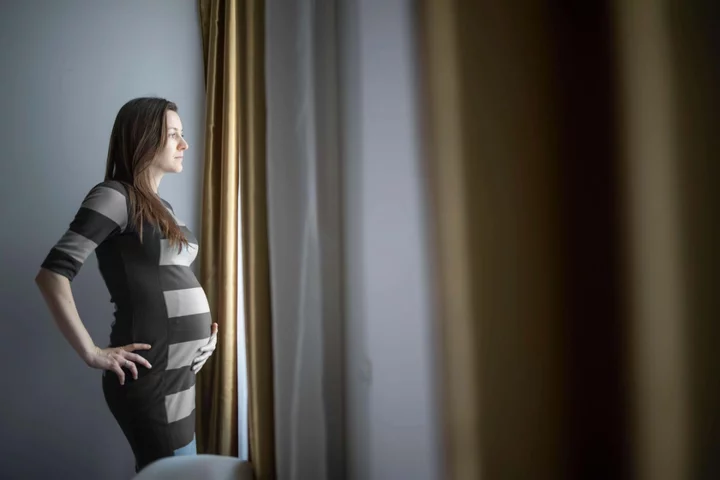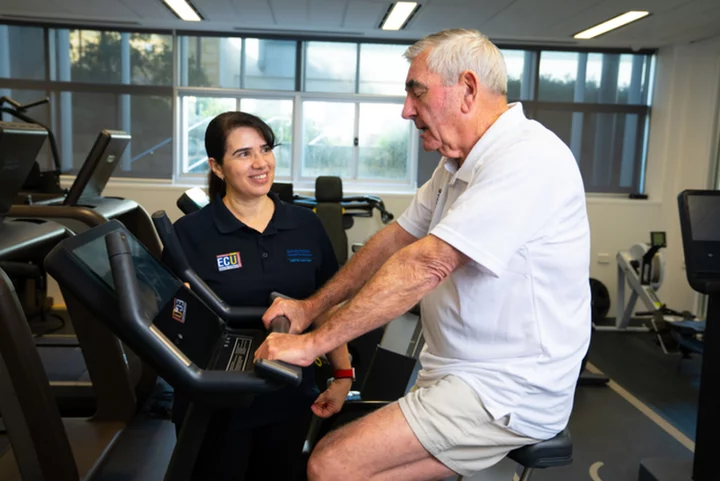
UN says fuel shortages will halt Gaza aid operations by the end of Wednesday
Vital fuel supplies needed to run hospitals and provide water to Gaza are on the verge of running out, a United Nations agency has said, exacerbating the crisis on a densely populated territory already facing severe shortages.
1970-01-01 08:00

Neglecting women’s health at work could cost UK economy £20.2bn a year – analysis
Neglecting women’s health in the workplace could be costing the UK economy around £20.2 billion each year, analysis has suggested. In a new survey of 2,000 women, 68% said that they have dealt with health issues at some point in their career, whilst almost 29% felt their employers were not supportive. When factoring in specific health matters that relate to women, including endometriosis, fertility, menopause and periods, this figure increases to 36%, leaving 46% of women worried that their health could impact their career trajectory and 48% thinking they would be forced to resign. The study conducted by AXA Health in partnership with the Centre of Economics and Business Research (CEBR) also suggested that 83% of women have had their personal finances affected when faced with health issues. For instance, 52% of women have had to take time off, 22% missed out on a promotion and 20% settled for lower pay. Economic modelling from AXA Health and CEBR suggested that ignoring women’s health at work could be costing the UK economy £20.2 billion a year. From 90% of women struggling emotionally, 46% feeling helpless and 43% feeling less motivated at work, this issue has also had a huge impact on their mental health and wellbeing. “As this report finds, neglecting the health of women in our workplaces isn’t just a matter of compassion; it’s a serious economic oversight,” said Flick Drummond MP, who is serving as the co-chair of the All-Party Parliamentary Group on Women and Work. Dr Pallavi Bradshaw, deputy chief medical officer at AXA Health, added: “While companies certainly still have a way to go in addressing women’s health at work, there is promise in the increased willingness of women to discuss their health concerns with colleagues and managers.. “For example, our women’s health report found that 60% of women who talked about their health found their employers to be supportive, whether this be through time off, offering counselling or making adaptations to the workplace. “These developments are positive, but as we delve further into the findings, it becomes evident that concerns extend beyond just health issues. A striking 53% of the women we surveyed voiced that, within their workplaces, women often shoulder more unplanned responsibilities – such as caring for loved ones – than their male counterparts. “Furthermore, when reflecting on their own families, 39% of respondents revealed that they bear a greater burden than male family members when it came to unexpected caring responsibilities. This gender-based imbalance in unpaid labour not only perpetuates inequality but also places women at risk of being sidelined in their careers, overlooked for promotions, or compelled to work beneath their true potential.” Bradshaw said the economic impact of neglecting women’s health is “still significant”, and urged the need for “more education, robust workplace policies and talent retention initiatives”. The report suggested women who work part-time are hit even harder when it comes to health-related issues. It found that 61% are worried about having to leave their jobs prematurely, which exceeds the average by 19%. Only 17% of women who work full-time believe that conversations surrounding women’s health are not encouraged in their workplaces, but this increases to 23% for those who are employed part-time. According to a report conducted by The Royal College of Obstetricians and Gynaecologists, women represent 51% of the population and 47% of the workforce. Read More Nearly three-quarters of mothers feel invisible, study suggests The best ways to work-out in 22 minutes – as study finds this is magic number for offsetting ‘negative impact of sitting’ What crops will we be growing in the future, as climate change alters the landscape? As Rebecca Adlington shares heart-breaking miscarriage news: How to support others experiencing baby loss What you need to know about new research into treating cervical cancer How to do Halloween make up and still take care of your skin
1970-01-01 08:00

Nearly three-quarters of mothers feel invisible, study suggests
Most women feel ‘invisible’ and ‘unappreciated’ when they become mothers, new research has revealed. Instead of ‘having it all’, 72% of mums feel invisible and 93% feel unappreciated, unacknowledged or unseen once they’ve had children. Another 93% said that since having a child, their identity has been reduced to only being a mother. And the weight of expectation is huge, too, with 97% of mums questioned in the survey by the online motherhood community Peanut saying pressure is put on them to ‘do it all and be it all’. Plus, 94% believe they’re expected to put themselves last and self-sacrifice for their families, partners, jobs, and other responsibilities, so they can achieve what they feel is required of them. Nearly half of mums (46%) said they don’t feel supported by the healthcare system after giving birth, and 70% expected more support from society in general. As a result of this lack of support and invisibility, most women surveyed (95%) agreed there’s an impact on their mental health and wellbeing, with 86% having experienced anxiety, 82% feeling stressed, burned out or exhausted, and 80% feeling overwhelmed, or lonely and isolated. Other strong feelings identified by mums included irritability (78%), loss of identity (65%), feeling judged (66%), feeling unsupported (64%), guilt (63%), depression (55%), resentment (54%), worthlessness (50%), and neglect (24%). Women attributed the things making them feel invisible to unfair division of labour in the home, trying to juggle a career and childcare, lack of empathy and understanding from both family and everyone else, gaps in healthcare and mental health support, identity and independence struggles, hiding the pain of pregnancy loss, and general pressure from healthcare, education institutions and the media. Commenting on the findings, psychologist Dr Rachel Goldman said: “The invisibility of motherhood is a stark reality many face. The journey begins with frequent visits to healthcare providers, but once the child arrives, there’s a sudden gap, creating a sense of abandonment. Women grapple with overwhelming feelings of exhaustion and stress, only to confront rushed appointments where healthcare professionals don’t have time to adequately dive into concerns.” As a result of the research, Peanut has launched an Invisible Mothers campaign, featuring a State of Invisibility report, to draw attention to mums’ struggles and highlight ways to make them more visible and better supported. The report found mums think more empathy and gender equality will help them feel more visible, with 82% calling for flexible, family-friendly workplaces, 77% wanting equal and extended leave for both parents, and 71% saying an equal share of parenting tasks would help. Additional measures that will help mums, says Peanut, include more public toilets having changing facilities, additional resources for mental health support, support groups for both parents, and educational initiatives about gender stereotypes. The report also identified the most common unwanted questions that contribute to mothers’ feelings of invisibility, with alternative suggestions that women say they would prefer to hear. So instead of asking ‘How’s the baby?’, Peanut suggests mums are asked ‘How are you really – mentally, emotionally and physically?’, and rather than ‘Was the pregnancy planned?’, try ‘Are you excited?’, and change ‘How do you do it all?’ to ‘How’s the mental load?’. Goldman added: “It doesn’t take grand gestures to offer support. A genuine ‘how are you’ or ‘thinking of you’ can significantly shift perceptions, signalling to someone that they matter. Small changes or actions, like compassionate conversations, can have profound impacts. “By acknowledging and addressing these issues, we can begin to truly support motherhood.” Read More The best ways to work-out in 22 minutes – as study finds this is magic number for offsetting ‘negative impact of sitting’ What crops will we be growing in the future, as climate change alters the landscape? As Rebecca Adlington shares heart-breaking miscarriage news: How to support others experiencing baby loss What you need to know about new research into treating cervical cancer How to do Halloween make up and still take care of your skin Which houseplants best suit your star sign?
1970-01-01 08:00

Aaron Sorkin departs CAA after agent made statements in support of Palestine amid conflict
Aaron Sorkin has departed CAA after an agent made a controversial statement about the Israel-Palestine conflict.
1970-01-01 08:00

'Leaning tower' in Italy closed off amid subsidence fears
The 'leaning' Garisenda tower in Bologna has been closed off as scientists monitor the medieval structure for sounds of cracking.
1970-01-01 08:00

Bank of Canada seen leaving rates on hold amid economic slowdown
By Steve Scherer OTTAWA The Bank of Canada is widely expected to leave its key overnight rate on
1970-01-01 08:00

Adani Auditor EY Faces Inquiry by India’s Accounting Regulator
One of the Adani Group’s longtime auditors is being scrutinized by India’s accounting regulator, according to people familiar
1970-01-01 08:00

Honda shelves plan to co-develop smaller EVs with GM - Bloomberg News
Honda Motor is shelving plans to jointly develop affordable electric vehicles (EVs) with General Motors due to a
1970-01-01 08:00

Creeslough explosion: Some NI ambulance crews 'could not assist'
Ambulance workers from Derry could not cross the border due to visa issues, an Irish politician says.
1970-01-01 08:00

Sony Honda Mobility could procure EV batteries from US, president says
TOKYO Sony and Honda's automotive joint venture could procure batteries for its new Afeela electric vehicle from the
1970-01-01 08:00

Just 25 minutes of daily exercise enough to cut death risk from prolonged sitting, scientists say
Working out for just about 20-25 minutes daily may be enough to cut a heightened risk of death due to a highly sedentary lifestyle, a new study finds. Adults in developed countries spend about 9-10 hours on average every day sitting down mostly while working, with the highly sedentary lifestyle linked to a heightened risk of death. The research, published in the British Journal of Sports Medicine, found just about 25 minutes of daily moderate to vigorous physical activity (MVPA) eliminates the risk of high sedentary time. Individual data from four groups of people, who were fitted with activity trackers, was pooled for the latest study by scientists, including those from The Arctic University of Norway. Researchers sought to find out whether physical activity might modify the association between sedentary time and death, and what amount of physical activity and sitting time may influence the risk. The analysis included data from nearly 12,000 people aged at least 50, who had a minimum of 4 days of 10 daily hours of activity tracker records. The participants had been monitored for at least two years, and had provided details of potentially influential factors, including their sex, educational level, weight, height, smoking history, alcohol intake and whether they had current and/or previous cardiovascular disease, cancer and/or diabetes. About 5,950 people spent fewer than 10.5 hours sitting down every day, while 6,042 clocked up 10.5 or more sedentary hours. Data from death registries found that during an average period of five years, 805 (7 per cent) people died, 357 (6 per cent) of whom spent under 10.5 hours sitting down every day and 448 of whom clocked up 10.5 hours or more. Being sedentary for more than 12 hours a day was found to be associated with a 38 per cent heightened risk of death compared with a daily tally of eight hours. But this was only among those registering fewer than 22 daily minutes of moderate to vigorous physical activity, scientists said. The study found over 22 daily minutes of moderate to vigorous physical activity was linked with a lower risk of death. Higher daily tallies of physical activity were found to be linked to an even lower risk irrespective of the amount of time spent seated every day. For instance, an extra 10 minutes a day of exercise was linked to a 15 per cent lower risk of death in those spending fewer than 10.5 sedentary hours. This extended duration of workouts was associated with a 35 per cent lower risk among those spending more than 10.5 sedentary hours every day. Citing the study’s main limitation, scientists said the research was observational and can’t establish cause and effect. The study could also not account for other potentially influential factors like diet, mobility issues and general health. However, scientists said small amounts of MVPA “may be an effective strategy to ameliorate the mortality risk from high sedentary time”. Read More Study reveals why millions of women wake up at 3.29am Sports culture is ‘intimidating’ and putting people off working out, study finds Running could be just as effective at treating depression as medication, scientists find This Chinese martial art may slow down Parkinson’s disease The best ways to work-out in 22 minutes – as study finds this is magic number for offsetting ‘negative impact of sitting’ Mick Jagger, father of eight, explains why parenting is ‘not like riding a bike’
1970-01-01 08:00

The best ways to work-out in 22 minutes – as study finds this is magic number for offsetting ‘negative impact of sitting’
Just 22 minutes of housework, jogging or brisk walking per day could offset the negative effects of sitting down for too long, new research has suggested. Researchers found sitting for extended periods – for example, long stints in front of the TV or working at a desk – is associated with dying earlier. However, participating in moderate-to-vigorous physical activity (MVPA) can eliminate the risk. At the more moderate end of the scale, this could be anything from heavy cleaning around the home, playing badminton or cycling at 10-12mph, while more vigorous activities could include jogging at 6mph or faster, playing football, basketball or tennis. The study, published online in the British Journal of Sports Medicine, backs up the UK chief medical officers’ recommendation of trying to get 150 minutes of MVPA per week – roughly 21 minutes per day. The research looked at data for 11,989 people aged over 50, half of whom where women, from Norway, Sweden and the US, who had worn activity trackers which measured their MPVA. How long they spent sitting daily was also recorded. Over a five-year follow-up, 805 of the people died. Author Edvard Sagelv, from the Arctic University of Norway, told the PA news agency: “In our study, we found that only those people doing more than 12 hours per day sitting had a higher risk of death. Every minute higher MVPA showed a lower risk of death – meaning if people were doing less than 22 minutes (such as 10 minutes) there was still a lower risk of death. “However, doing 22 minutes eliminated the higher risk of death from sedentary time. This means that if doing 22 minutes or more per day, there was no excess risk from sedentary time. And, if doing more than 22 minutes per day, there was a lower risk of death overall. Basically, the more the better.” How can I get the best workout in 22 minutes? Less than half an hour a day to offset the negative effects of sitting for too long is good news for anyone who normally struggles to find time to exercise – but how can you make those 22 minutes really count? We asked a fitness pro for some suggestions… Compound exercises Ali Malik, personal trainer and founder of Fit Labs Kensington, suggested focusing on compound exercises. “Compound exercises are full-body exercises that engage with multiple muscle groups at the same time. When you are limited in time, it would be more beneficial to do a squat, for example, which engages your core, lumber spin and whole lower body, instead of a bicep curl, which doesn’t,” Malik said. “Push-ups are also great, as they engage your upper body muscles and core. If you are doing it on your knees, you use less of your legs, but a full push-up will be using your glutes and legs as well – engaging with more than one muscle group.” Planks are another great compound exercise, because “it’s predominately about your core but engages your full body, as you have to work hard to keep yourself stabilised”. Malik added: “People sometimes think dead lifts is an advanced exercise, but it’s not. Everyone does a does at least one everyday. For example, if you are picking up a bag from the floor, that’s a dead lift. It can be done with anything as light as two plastic bags filled with a water bottle each, but if you are in the gym you can use dumb bells and kettle bells.” Circuits For a well-rounded workout in 22 minutes, Malik also suggested a circuit based workout – starting with a three-minute warm-up. “This could include a cat cow stretch, a walk out [start standing up, then bend forwards and walk your body out in front of you using your hands, and then back up to standing], then jumping jacks to get your heart rate up and loosen your muscles.” Then for the circuits, it’s all about repeating multiple exercises in the same order. “I would do 10 squats, 10 press-ups and a 30-second plank. Then rest for 30 seconds, and then repeat that pattern six times. This is about 16 minutes of the workout,” said Malik. “But if you are feeling bored and would like to switch things up, you could do 10 lunges, 10 shoulder taps and leg raises instead.” Being efficient during a short workout is key, added Malik: “You don’t want to rush through the exercises to risk poor form, but you also don’t want to waste time with long five minute breaks.” Allow for a three-minute cool-down at the end. Malik explained: “It’s all about calming movements at this stage, to bring down your heart rate and relax your muscles. Start with a child pose, striking cobra – push your pelvis into the floor and then raise your chest, whilst applying pressure with both hands on either side of the body – then I would do a pigeon pose, where you have one leg out in front of you in a bent position and one leg behind you that is straight. This stretches your glute muscles.” What are the benefits? There are various benefits to exercises using this format. Malik said: “It will elevate your heart rate, put your muscles under tension to maintain and build strength, and help with your cardiovascular system.” Read More What crops will we be growing in the future, as climate change alters the landscape? As Rebecca Adlington shares heart-breaking miscarriage news: How to support others experiencing baby loss What you need to know about new research into treating cervical cancer How to do Halloween make up and still take care of your skin Which houseplants best suit your star sign? 5 of the hottest new perfume launches for autumn/winter
1970-01-01 08:00
